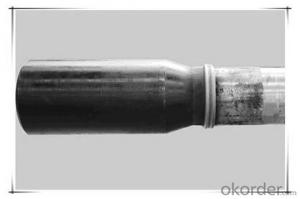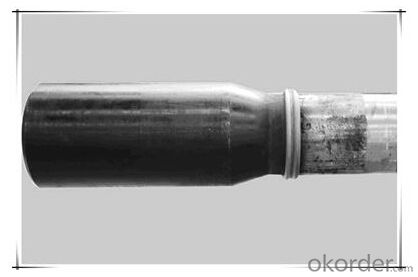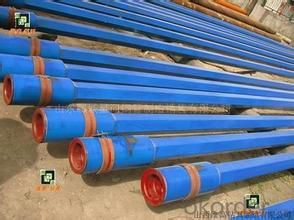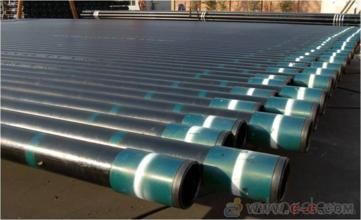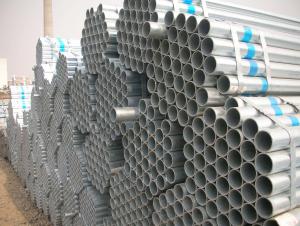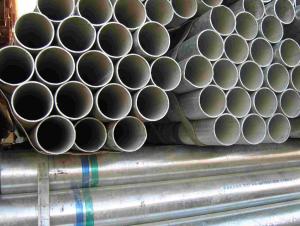Drill Pipe for Oil and Gas Industry Use
- Loading Port:
- China Main Port
- Payment Terms:
- TT or LC
- Min Order Qty:
- -
- Supply Capability:
- -
OKorder Service Pledge
OKorder Financial Service
You Might Also Like
DRILL PIPES FOR OIL AND GAS INDUSTRY USE
NO | STEEL GRADE | SPECIFICATION | NORMAL | ||
OD | WT | LENGTH | |||
/mm | /mm | /m | |||
1 | 26CrMo 27CrMo45 4140 | 60.32~168.28 | 5~16 | 6~12 | TECHNICAL AGREEMENT |
Specifications
Oil Well Drill Pipe API Standard
1. Good price and timely delivery
2. 100% inspection
3. High quality maintains
Length: 1,000mm ~ 9,000mm;
Diameter: 60.32mm ~ 168.28mm;
Wall Thickness: 5.5mm ~ 8mm;
Connection Thread: 2 3/8”, 2-7/8”, 3-1/2”, 4 1/2” API Reg. or API IF Thread.
Features:
Drill rod is made of high quality material detected by spectrograph, impact and tension test.
With fully digitized processing line introduced from Japan with integral heat treatment equipment
Anti adhesion thread with nitrogen treatment on surface make it easier for handling.
Metallography detection, hardness test, magnaflux inspection, ultrasonic flaw detection, tensile test and impact test ensure products quality.
FAQ of Drill Pipe:
①How is the quality of your products?
Our products are manufactured strictly according to national and internaional standard, and we take a test on every pipe before delivered out. If you want see our quality certifications and all kinds of testing report, please just ask us for it.
Guaranteed: If products’ quality don’t accord to discription as we give or the promise before you place order, we promise 100% refund.
②How about price?
Yes, we are factory and be able to give you lowest price below market one, and we have a policy that “ for saving time and absolutely honest business attitude, we quote as lowest as possible for any customer, and discount can be given according to quantity”,if you like bargain and factory price is not low enough as you think, just don’t waste your time.Please trust the quotation we would give you, it is professional one.
③Why should you chose us?
Chose happens because of quality, then price, We can give you both.Additionally, we can also offer professional products inquiry, products knowledge train(for agents), smooth goods delivery, exellent customer solution proposals.Our service formula: good quality+good price+good service=customer’s trust
SGS test is available, customer inspection before shipping is welcome, third party inspection is no problem.
Any question, pls feel free to contact us !
Drill Pipe Images
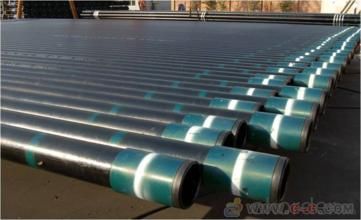
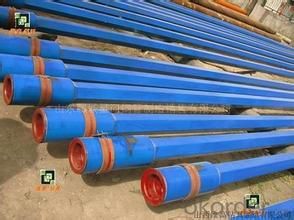
- Q: Is the PVC tube a plastic tube or a plastic tube?.
- It's plastic tubePolyvinyl chloride (Poly, Vinyl, Chloride, PVC)PVC is a VCM monomer (vinyl, chloride, monomer), in peroxide, azo compounds and other initiators;
- Q: What are the advantages of using steel pipes in the manufacturing of storage tanks?
- There are several advantages of using steel pipes in the manufacturing of storage tanks. Firstly, steel pipes are highly durable and have a longer lifespan compared to other materials, ensuring the longevity of the storage tank. Secondly, steel pipes have high strength and can withstand high pressure and extreme temperatures, making them suitable for storing a wide range of substances. Additionally, steel pipes are resistant to corrosion and can be coated to further enhance their protection against rust and other chemical reactions. Lastly, steel pipes are readily available and can be easily fabricated, making them a cost-effective choice for the manufacturing of storage tanks.
- Q: What are the different methods of protecting steel pipes from external damage?
- There are several methods of protecting steel pipes from external damage, including coating the pipes with a corrosion-resistant material such as epoxy or polyethylene, applying a layer of protective tape, installing a cathodic protection system, using concrete or rock shielding, and implementing measures to prevent soil movement or impact damage.
- Q: Are steel pipes suitable for underground sewage lines?
- Yes, steel pipes are suitable for underground sewage lines. They are strong, durable, and resistant to corrosion, making them an excellent choice for sewage systems.
- Q: How do steel pipes resist corrosion?
- Steel pipes resist corrosion through a process called passivation, wherein a protective layer of oxide forms on the surface of the steel, preventing further oxidation and corrosion. Additionally, the pipes can be coated with anti-corrosive materials or undergo treatments such as galvanization or lining to enhance their resistance against corrosion.
- Q: What are the different types of connections used with steel pipes?
- There are several types of connections commonly used with steel pipes, including threaded connections, welded connections, flanged connections, and grooved connections.
- Q: How do you calculate the thermal expansion of steel pipes?
- To calculate the thermal expansion of steel pipes, you need to know the coefficient of thermal expansion (CTE) of the specific type of steel used. This value represents how much the steel material expands or contracts per unit length with each degree of temperature change. Once you have the CTE, you can multiply it by the initial length of the steel pipe and the temperature change to determine the thermal expansion. The formula is: Thermal Expansion = CTE x Initial Length x Temperature Change.
- Q: Are steel pipes suitable for conveying fluids?
- Yes, steel pipes are suitable for conveying fluids. Steel pipes have been widely used in various industries for many years due to their durability, strength, and resistance to corrosion. These qualities make steel pipes an ideal choice for conveying fluids such as water, oil, gas, and even hazardous chemicals. The smooth interior surface of steel pipes also allows for efficient flow and prevents clogging, making them suitable for applications that require a continuous and smooth flow of fluids. Furthermore, steel pipes can withstand high pressure and temperature conditions, making them suitable for both high and low-pressure fluid transmission systems. Overall, steel pipes are a reliable and efficient option for conveying fluids in a wide range of industries, including oil and gas, water treatment, chemical processing, and many more.
- Q: What are the different types of supports used for underground steel pipes?
- There are several types of supports commonly used for underground steel pipes, including concrete cradles, saddle supports, and thrust blocks. These supports help distribute the weight and forces acting on the pipe, ensuring its stability and preventing damage.
- Q: What is the lifespan of a steel pipe?
- The lifespan of a steel pipe can vary depending on various factors such as its quality, maintenance, and usage conditions. However, with proper care and maintenance, a well-made steel pipe can last for several decades or even more.
Send your message to us
Drill Pipe for Oil and Gas Industry Use
- Loading Port:
- China Main Port
- Payment Terms:
- TT or LC
- Min Order Qty:
- -
- Supply Capability:
- -
OKorder Service Pledge
OKorder Financial Service
Similar products
Hot products
Hot Searches
Related keywords
